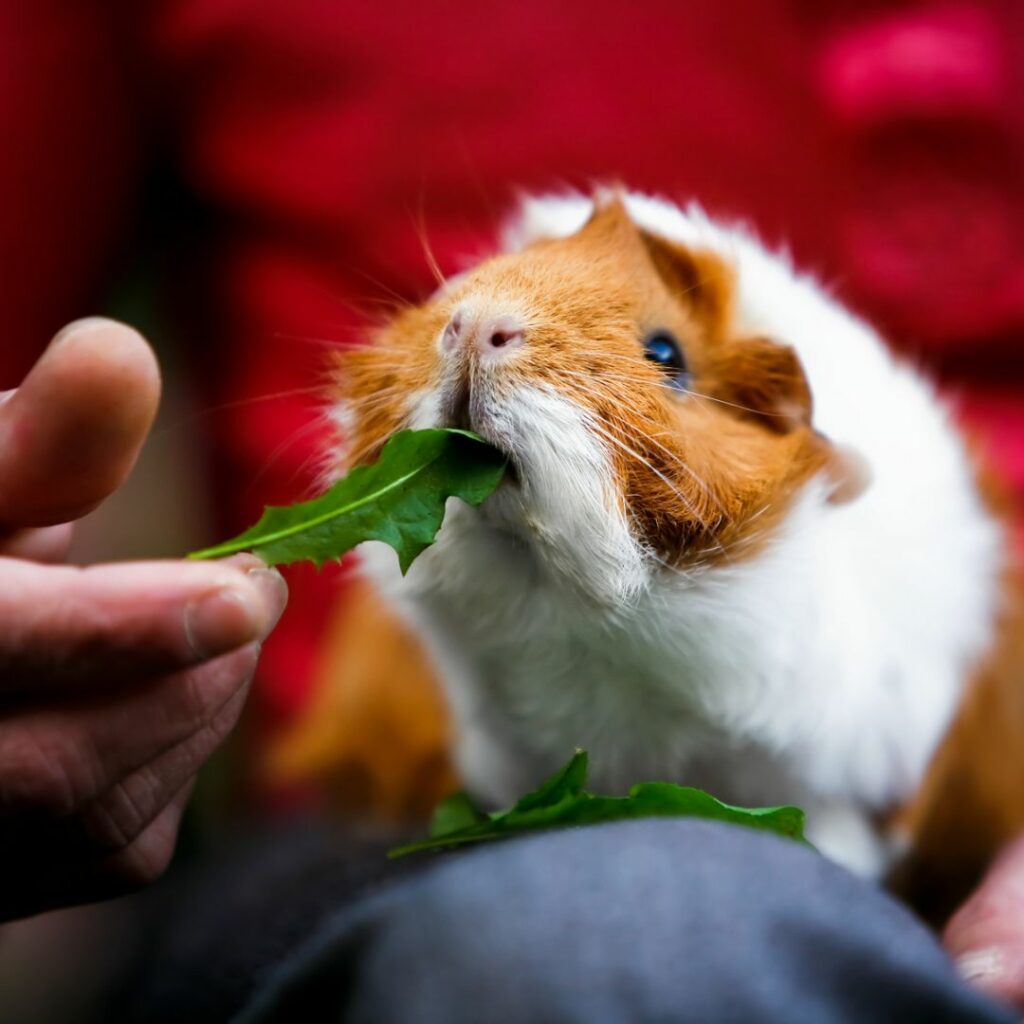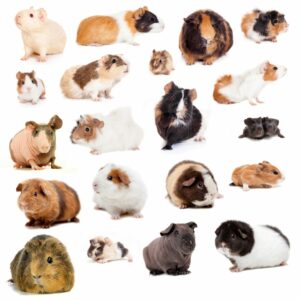Guinea pigs are immaculate groomers. Their natural body scent is not intense and doesn’t emit a bad odor.
But a bad smell from your guinea pig can indicate health, diet-related, and environmental issues.
Let’s talk about causes and solutions to guinea pig smell.
Table of Contents
Reasons Why Guinea Pigs May Emit Odors
Here are some of the most common reasons you may notice a bad odor coming directly from your piggies or their cage/hutch:
Diet

When guinea pigs eat excessive sugar or processed food, it can upset their digestive system. This imbalance promotes the growth of harmful bacteria in their mouth, resulting in smelly breath.
Also, a poor diet lacks the vital nutrients guinea pigs need for healthy fur. It can affect their overall health, leading to greasy and unkempt fur, potentially causing an unpleasant odor.
Maintaining a balanced diet of fresh hay, veggies, fruits, clear water, and high-quality guinea pig pellets is critical. This provides the nutrients for good health and helps control your piggy’s breath and fur odor.
Environmental Factors
One of the most common causes of unpleasant odors associated with guinea pigs is their environment. And it’s simple – if it’s dirty, it smells.
A cage filled with soiled bedding, waste (poop and urine), or uneaten food can quickly become a source of noticeably bad smell. This is why it’s important to keep the habitat of your piggies constantly clean.
Bedding Selection
The choice of bedding material plays a critical role in odor control. So, try to opt for high-quality bedding. Some of the popular and safest material choices are fleece, cloth, and paper.
Fleece and cloth beddings are naturally dust-free, practical to keep clean, easy to store away, and eco-friendly since they’re reusable.
Paper bedding is another good option, but you should look for clean, plain paper bedding instead of ones with toxic chemicals like ink.
On the other hand, you should stay away from:
- Newspaper: Newspaper contains ink which is toxic for a guinea pig. Since guinea pigs love nibbling, ink ingestion and poisoning are always risky.
- Straw: While straw is one of the more natural options, it can easily become moldy. Mold in bedding can make guinea pigs seriously sick. It often causes respiratory infections, but it can also damage the kidneys and liver.
- Wood shavings (cedar, aspen, pine, etc.): Beddins consisting of wood shavings release essential oils and chemicals like phenols, dangerous for guinea pigs, and have a strong scent. These beddings can potentially cause respiratory infections and breathing difficulties for a guinea pig.
Grease Glands
Guinea pigs have scent glands, better known as grease glands. They’re located near a guinea pig’s anogenital region at the base of their spine. Both males and females have them, but the scent is much more common and stronger in males.
The grease gland releases a thick, oily substance over time. This oil then changes to a gummy substance as it dries. During their mating period, guinea pigs will produce significantly more of this oil, causing an intense smell that may catch you off guard.
This gland emits an unpleasant odor and can often lead to a build-up of dry skin, shed hair, hay pieces, and other dirty debris.
If you don’t clean your guinea pigs’ grease glands regularly, it can make them uncomfortable. In some cases, it can lead to infections and require veterinarian intervention.
Considering how delicate guinea pigs are, you may want to visit your vet and get professional help when cleaning your piggy’s grease gland at the beginning – until you feel ready.
Fighting Against Bad Odors
Now that we’ve covered the causes of unpleasant smells that may come from your guinea pigs, let’s talk about the most effective ways to prevent and fight against it.
Daily Spot Cleaning
Guinea pigs urinate and defecate frequently. There might be some leftover food hidden in the bedding.
Regardless of the type and material of your guinea pig bedding, it’s important to clean your cages daily to prevent piled-up waste and combat these unpleasant odors effectively.
Vacuum or sweep all the waste, dirt, food, and even hair in the cage.
Pro tip: Your piggies should also have litter boxes in their space. Just don’t forget to take some time and clean them too!
Choosing the Right Bedding
Beddings can emit bad odor due to feces, urine, rotten food, and other possible waste. This is why it’s mandatory to choose the proper bedding.
Here are some of the high-quality beddings to consider:
- The Carefresh 99% Dust-Free Paper Bedding
- Guinea Pig Cage Liners by Pequano
- Kaytee Clean & Cozy Lavender Bedding For Pet Guinea Pigs
Remember: Avoid wood shavings. Instead, look for beddings made of super-absorbent, soft, comfortable, odor-resistant, and non-toxic materials.
Regular Bedding Changes
While choosing the right bedding plays a critical role in preventing bad smells, it won’t help much if you’re not changing it regularly.
Guinea pigs are incredibly adventurous and spend about 20 hours being active, so it’s completely expected they’ll often make a mess in their cage.
Remember: Unpleasant odors will mostly come from feces and urine in the filthy environment of your piggies.
The frequency of bedding changes should depend on the number of guinea pigs in the enclosure. But on average, you should change it once every few days, helping you to get rid of the odors from soiled bedding, waste, and food remnants.
Protect the Bedding with Cage Liners
Considering how frequently guinea pigs urinate, it shouldn’t be surprising to notice soaked bedding in their cage or hutch, possibly becoming smelly.
One of the best solutions to prevent this is to use cage liners (or pee pads). You could lay them out in the corners. But try to look for areas where your piggies usually do their business – if they have a favorite spot for relieving themselves, just place the pee pads there.
Also, don’t forget to change the pads daily, as they can become a soggy mess over time.
If you haven’t used any cage liners or pee pads before, here are a few options to check out:
- Paw Inspired Disposable Guinea Pig Cage Liners
- GINIDEAR Disposable Guinea Pig Cage Liners
- Arm & Hammer Super Absorbent Cage Liners for Guinea Pigs
Establish a Fresh Airflow
Another important factor that plays a vital role in preventing a bad odor is fresh air. Your guinea pig cage should always be in a well-ventilated space.
Pro tip: You could also place a fan nearby- but not directly towards your piggies.
Maintaining a Healthy and Balanced Diet
One of the more indirect ways to get rid of bad smells is to provide a healthy and balanced diet for your piggies. When they consume a well-balanced diet, their poop remains odor-free and easy to manage.
On the other hand, an imbalanced diet can lead to changes. Depending on what guinea pigs eat, there could be a change in texture and consistency of their waste, and the smell could also be much worse.
Also, the healthier diet you provide, the better for your piggy’s well-being.
Vet Q&A
Do guinea pig cages smell bad?
Yes, guinea pig cages can develop an unpleasant odor if not properly maintained. This is primarily due to the accumulation of urine, feces, and hay.
However, with regular cleaning and proper care for your guinea pigs, you can effectively prevent the buildup of odor and maintain a fresh and pleasant environment for both you and your furry friends.
Does guinea pig urine smell?
Yes, guinea pig urine has a mild odor, similar to the urine of other small mammals. However, their urine generally has a weaker scent compared to other rodents.
If you notice a strong, unpleasant odor in your guinea pig’s urine, it’s likely due to soiled bedding. When urine accumulates in the bedding, it can start to break down and release ammonia, which has a strong, pungent smell. This is a sign that it’s time to replace and clean the bedding promptly to prevent further odor buildup.
Do guinea pigs need baths?

American Veterinary Medical Association (AVMA) suggests that guinea pigs generally do not require regular baths, as they are naturally meticulous groomers. Their fur produces natural oils that help keep it clean and healthy. Excessive bathing can strip away these essential oils, leading to dry skin and potential skin irritation.
However, there are situations where bathing your guinea pig may be necessary. If your guinea pig’s fur becomes soiled with dirt, feces, or other contaminants, a gentle bath can help clean their coat and remove any unpleasant odors. Additionally, if your guinea pig develops skin issues such as mats or parasites, your veterinarian may recommend bathing as part of the treatment plan.
When bathing your guinea pig, it’s crucial to use a mild shampoo specifically formulated for guinea pigs. Avoid using human shampoo or harsh detergents, as these can irritate their delicate skin. Gently lather the shampoo onto your guinea pig’s wet fur, avoiding the face and ears. Rinse thoroughly with lukewarm water and towel dry completely.
If you’re unsure about bathing your guinea pig, it’s always best to consult with your veterinarian for guidance and expert advice. They can assess your guinea pig’s individual needs and provide personalized instructions on bathing techniques and frequency.
Does guinea pig poop smell?
Typically, guinea pig poop doesn’t have a strong odor. However, any changes in the size, shape, consistency, or smell of your guinea pig’s poop could be a sign of an underlying health issue.
If you notice your guinea pig’s poop has developed an unpleasant odor, it’s most likely due to digestive problems. These problems can arise from various factors, including:
An unhealthy or unbalanced diet: Feeding your guinea pig a diet that lacks essential nutrients or contains too many sugary or processed foods can disrupt their digestive system and alter the appearance and smell of their poop.
Dental problems: Guinea pigs’ teeth grow continuously throughout their lives, and they need to constantly chew to wear them down. If their teeth become overgrown or misaligned, they may have difficulty eating properly, leading to digestive issues and changes in poop consistency.
Gastrointestinal motility problems: Proper movement of food through the digestive tract is essential for healthy digestion. If your guinea pig’s gastrointestinal motility is impaired, it can cause constipation, diarrhea, or other digestive problems that can manifest as changes in poop consistency and odor.
In rare cases, a strong odor in guinea pig poop could also be a sign of an infection. If you notice any significant changes in your guinea pig’s poop, especially if accompanied by other symptoms such as lethargy, loss of appetite, or weight loss, it’s important to consult with your veterinarian. They can assess your guinea pig’s overall health and determine the underlying cause of the changes in their poop.
My Senior Paws is a participant in the Amazon Services LLC Associates Program, an affiliate advertising program designed to provide a means for sites to earn advertising fees by advertising and linking to Amazon.com. We also participate in other affiliate programs which compensate us for referring traffic.




